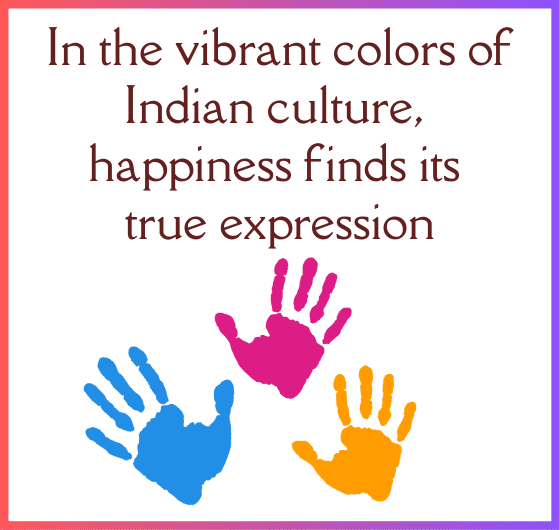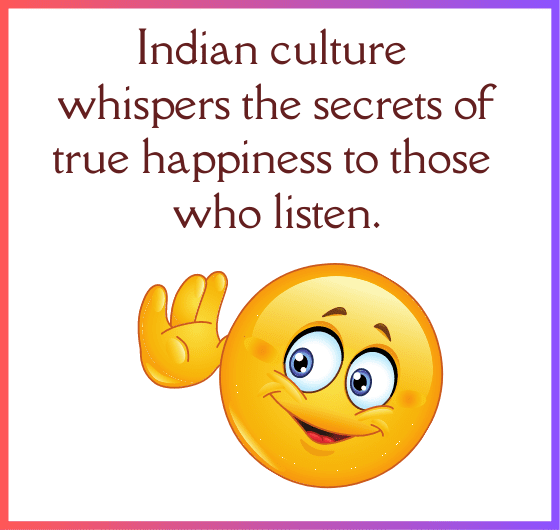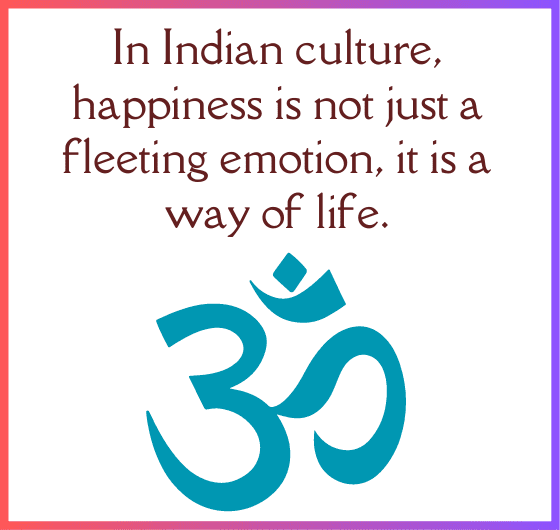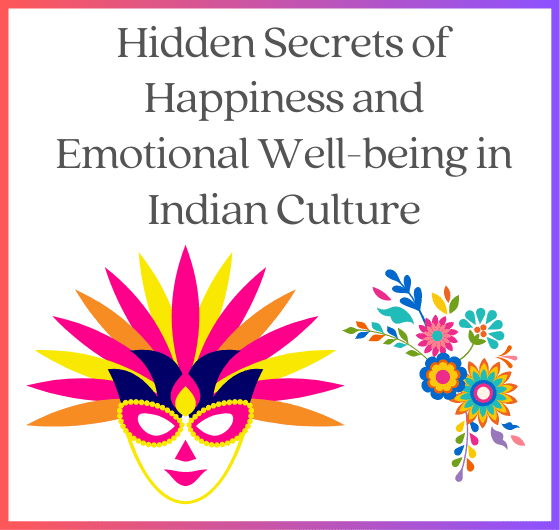The concept of happiness has been an integral part of Indian culture for centuries, with spirituality playing a crucial role in promoting it. In the Indian tradition, happiness is viewed as a state of mind that can be achieved through various spiritual practices, including meditation, yoga, and self-reflection. Happiness in Indian culture holds significant importance and is deeply rooted in various aspects of life.
** Spirituality plays a crucial role in promoting happiness in Indian culture.
** Happiness is viewed as a state of mind that can be achieved through spiritual practices.
** Meditation, yoga, and self-reflection are common practices that help individuals connect with their inner selves.
** By fostering a sense of peace, contentment, and happiness, spirituality can enhance overall well-being.
** Prioritizing values and relationships is encouraged by spiritual practices, further contributing to happiness.
** Ultimately, the power of happiness in Indian culture lies in its ability to foster a deeper sense of purpose and meaning in life.
** By focusing on spirituality, individuals can achieve a sense of fulfillment and happiness that extends beyond mere material possessions.
“In Indian culture, happiness is not just a fleeting emotion, it is a way of life.”

The Role of Spirituality in Promoting Happiness in Indian Culture
Spirituality plays a profound role in promoting happiness within Indian culture. Rooted in ancient wisdom and traditions, spirituality serves as a guiding force for individuals seeking inner fulfillment and contentment. In Indian culture, happiness is not solely derived from external achievements but is deeply connected to the state of one’s inner being.
Spirituality provides a pathway to explore and nurture this inner realm, offering various practices and philosophies to enhance emotional well-being.
Meditation, yoga, and mindfulness techniques are embraced as powerful tools to calm the mind, reduce stress, and cultivate a sense of peace and tranquility.
These practices help individuals detach from materialistic desires and connect with their true selves. Indian spirituality also emphasizes the values of compassion, love, and service to others, which contribute to a sense of purpose and fulfillment.
Through acts of selflessness and kindness, individuals experience joy and a deeper connection with the world around them.
Furthermore, spiritual rituals and festivals are integral parts of Indian culture, bringing people together in celebration, and fostering a sense of community and unity.
Overall, spirituality in Indian culture offers a holistic approach to happiness, focusing on the development of inner well-being, harmonious relationships, and a profound connection with the divine.
Here are a few bullet points summarizing the role of spirituality in promoting happiness in Indian culture:
** Spirituality in Indian culture nurtures inner fulfillment and contentment.
** Practices like meditation, yoga, and mindfulness reduce stress and cultivate peace.
** Indian spirituality emphasizes compassion, love, and service to others.
** Acts of selflessness and kindness contribute to a sense of purpose and joy.
** Spiritual rituals and festivals foster community and unity.
** Happiness in Indian culture is not solely based on external achievements but on inner well-being and a connection with the divine.
The Connection between Indian Festivals and Happiness in Indian Culture
Indian festivals are known for their vibrancy, energy, and joyful spirit, and their connection to happiness in Indian culture is undeniable. Here are a few points that highlight this connection:
** Indian festivals are often rooted in ancient traditions and religious customs, providing a sense of continuity and connection to the past.
** Festivals are also a time for families and communities to come together, fostering a sense of belonging and connection that can promote emotional well-being and happiness.
** Many festivals involve music, dance, and other forms of artistic expression, which can promote positive emotions and uplift mood.
** Festivals are often accompanied by delicious food and sweets, providing a sensory experience that can enhance feelings of pleasure and happiness.
** Overall, the power of happiness in Indian culture is often reflected in the joy and celebration that accompany festivals, highlighting the importance of community, tradition, and artistic expression in promoting emotional well-being.
“The true secret of happiness lies in taking a genuine interest in all the details of daily life.” – William Morris
The Importance of Family in Indian Culture and its Impact on Happiness
Family is the backbone of Indian culture, and its impact on happiness cannot be ignored. Indian families are known for their strong bonds and close relationships, which create a sense of belonging and security. Families provide emotional support, care, and nurture, creating a positive atmosphere that fosters happiness and contentment. In Indian culture, families are considered the primary source of social and moral values, reinforcing a sense of identity and purpose.
In Indian culture, family is considered a cornerstone of happiness and emotional well-being. Here are some reasons why:
** Family provides a strong support system and a sense of belonging, which can enhance feelings of happiness and security.
** The emphasis on intergenerational living and the care of elders reinforces the importance of family in Indian culture and promotes a sense of responsibility and respect for one’s roots.
** Family gatherings and celebrations, such as weddings and festivals, are important social events that provide opportunities for bonding and creating lasting memories.
** The value placed on family also extends to one’s relationships with extended family and close friends, creating a sense of community and connection that can contribute to overall happiness and well-being.
** Overall, the power of happiness in Indian culture is deeply intertwined with the importance of family, highlighting the significance of strong relationships and a sense of belonging for emotional health and fulfillment.
The importance of family in Indian culture extends beyond immediate family members, with extended families and communities also playing a significant role in shaping individual happiness. Ultimately, the power of happiness in Indian culture is amplified by strong family ties, emphasizing the importance of human connections in promoting happiness and well-being.
“Indian culture teaches us that true happiness is not found in material possessions, but in spiritual wealth.”

The Effect of Indian Cuisine on Happiness Levels
Indian cuisine is known for its rich flavors, vibrant colors, and intricate use of spices and herbs. But beyond its taste and culinary techniques, Indian cuisine also has a significant impact on happiness levels in Indian culture. Here are a few points that highlight this relationship:
** Many Indian dishes incorporate ingredients that have been shown to have mood-boosting effects, such as turmeric, saffron, and ginger.
** The use of spices in Indian cuisine can also promote digestion and overall physical wellness, which can contribute to feelings of happiness and well-being.
** The ritual of cooking and sharing meals in Indian culture fosters a sense of connection and community, which is important for emotional health and happiness.
** Many Indian dishes are associated with religious and cultural traditions, which can provide a sense of meaning and purpose that is also linked to emotional well-being.
** Overall, the power of happiness in Indian culture is reflected in the joy and pleasure that come from experiencing the diverse and delicious flavors of Indian cuisine, highlighting the importance of food, community, and tradition in promoting emotional well-being.
Indian cuisine has a significant impact on happiness levels in Indian culture, with its unique flavors and aromas evoking feelings of joy and contentment. The power of happiness in Indian culture is amplified by the diverse range of ingredients and spices used in Indian cooking, which are known for their mood-boosting properties.
Traditional Indian foods such as dal, chana masala, and biryani are rich in nutrients and spices that have been linked to improved mental health and well-being.
Moreover, Indian cuisine is often associated with social gatherings and festive occasions, creating a positive atmosphere that fosters happiness and a sense of community.
Overall, the effect of Indian cuisine on happiness levels in Indian culture is undeniable, highlighting the power of food to promote happiness and well-being.
The Relationship between Yoga and Happiness in Indian Culture
Yoga has been an integral part of Indian culture for thousands of years, and its connection to emotional well-being and happiness is well-established. Here are a few points that highlight this relationship:
** Yoga is a form of physical exercise that promotes the release of endorphins, which can elevate mood and reduce stress.
** The meditative nature of yoga, including focused breathing and mindfulness practices, has been shown to reduce symptoms of anxiety and depression and promote emotional well-being.
** Yoga is also believed to balance the body’s energy systems, promoting physical and emotional harmony.
** In Indian culture, yoga is often practiced in community settings, fostering a sense of connection and belonging that can positively impact emotional well-being.
** Overall, the relationship between yoga and emotional well-being in Indian culture highlights the importance of engaging in physical activity and mindfulness practices as part of a holistic approach to achieving happiness and fulfillment.
“The pursuit of happiness is a universal human desire, but Indian culture shows us that the path to true happiness lies in self-awareness and spiritual growth.”
The Impact of Indian Classical music on Mood and Happiness
Indian classical music is a form of art that has been deeply intertwined with Indian culture for centuries. Its impact on mood and happiness is undeniable, with its soothing melodies and rhythms having a calming effect on the mind and body.
The power of happiness in Indian culture is amplified by the unique qualities of Indian classical music, which evoke a range of emotions and feelings of joy and contentment.
Research has shown that listening to Indian classical music can reduce stress and anxiety, improve focus and concentration, and promote relaxation and restful sleep.
Moreover, the social and cultural significance of Indian classical music in Indian culture creates a sense of community and belonging, further contributing to overall happiness and well-being.
Overall, the impact of Indian classical music on mood and happiness highlights the power of the arts in promoting well-being and happiness.
The Significance of Meditation and Mindfulness in Promoting Happiness in Indian Culture
Meditation and mindfulness have been integral to Indian culture for thousands of years, with their significance in promoting happiness and well-being being widely recognized. Here are a few points that highlight their importance:
** Meditation and mindfulness practices are known to reduce stress, anxiety, and depression, leading to a greater sense of inner peace and contentment.
** These practices help individuals connect with their inner selves and cultivate a deeper sense of purpose and meaning in life.
** Meditation and mindfulness also enhance self-awareness, allowing individuals to identify and manage negative thought patterns and emotions more effectively.
** In Indian culture, meditation and mindfulness are often linked to spiritual practices and a sense of interconnectedness with the universe, further reinforcing their power to promote happiness and well-being.
** The incorporation of meditation and mindfulness into daily routines is a common practice in Indian culture, emphasizing their significance in promoting overall health and happiness.
“Indian culture teaches us to find happiness within ourselves, rather than seeking it in external sources.”

The Role of Community and Social Support in Indian Culture and Happiness
In Indian culture, community and social support play a crucial role in promoting emotional well-being and happiness. Here are a few points that highlight their importance:
** Indian culture places a strong emphasis on family and community, creating a sense of belonging and support that is essential for emotional well-being.
** Community and social support networks provide individuals with a sense of purpose and meaning in life, which is critical to overall happiness.
** These networks also offer opportunities for socializing, which can help alleviate feelings of loneliness and isolation.
** In times of crisis, community, and social support networks provide a safety net for individuals, reducing stress and anxiety and promoting resilience.
** Overall, the role of community and social support in Indian culture highlights the importance of social connections in promoting emotional well-being and happiness.
The Effect of Indian Art and Dance on Happiness and Well-being
Indian art and dance have been recognized for their therapeutic effects on emotional well-being and happiness. Here are a few points that highlight their significance:
** Indian art and dance have been used for centuries as a form of self-expression and a means of promoting emotional well-being.
** Art and dance allow individuals to channel their emotions into creative outlets, helping them to process and express their feelings in a healthy way.
** The meditative and rhythmic nature of Indian dance, such as Bharatanatyam and Kathak, has been shown to reduce stress and anxiety and promote relaxation and mindfulness.
** The vibrant colors and intricate designs of Indian art, such as Madhubani and Warli, have a stimulating effect on the mind and can promote feelings of joy and contentment.
** Overall, Indian art and dance are powerful tools for promoting emotional well-being and happiness, showcasing the importance of creative expression in maintaining a healthy mind and body.
“In Indian culture, happiness is not just an individual pursuit, it is a collective responsibility.”
The Connection between Indian Literature and Happiness in Indian Culture
Indian literature, including ancient epics and modern-day works, has long been associated with promoting emotional well-being and happiness. Here are a few points that highlight this connection:
** Indian literature often explores themes such as love, compassion, and spirituality, which can promote positive emotions and foster a sense of well-being.
** Reading can be a form of escapism, allowing individuals to temporarily detach from their problems and experience a sense of relaxation and calm.
** Indian literature is also known for its powerful storytelling, which can evoke a range of emotions and lead to a greater sense of empathy and connection with others.
** In Indian culture, storytelling and reading have been used as a form of therapy, helping individuals process and cope with their emotions.
** Overall, the connection between Indian literature and emotional well-being underscores the importance of engaging with art and culture in promoting happiness and fulfillment.

Story of a guru teaching his student, about the role of spirituality in promoting happiness in Indian culture
Guruji welcomed Raj with a warm smile and invited him to sit beside him under the shade of a giant banyan tree. “Raj, my dear student,” Guruji began, “happiness is not found in the external world, but within ourselves. Let me share some examples from Indian culture to illustrate this.”
“Have you ever noticed the joy and contentment on the faces of farmers as they harvest their crops?” Guruji asked. “Their hard work and connection with nature bring them immense happiness. They understand that abundance comes from gratitude and nurturing the earth.”
Guruji continued, “In festivals like Diwali, people light lamps to symbolize the victory of light over darkness. It teaches us that happiness can be found by embracing our inner light and spreading it to others.”
He then shared the story of a kind-hearted old woman who devoted her life to serving others. “Her selfless actions and love for humanity brought her unparalleled happiness. She found that by helping others, she was nourishing her own spirit.”
As Raj listened attentively, Guruji spoke of the power of meditation and yoga. He explained how these practices bring harmony to the mind, body, and soul, leading to a state of inner peace and happiness. “Through meditation, we connect with our true selves and experience the divine presence within,” Guruji said.
The young student’s eyes lit up with understanding as he absorbed Guruji’s teachings. He realized that spirituality in Indian culture emphasized the importance of self-discovery, compassion, and gratitude as pathways to happiness.
With gratitude in his heart, Raj bowed to Guruji and said, “Thank you, Guruji, for showing me the way to true happiness. I will strive to embody these teachings and share the wisdom with others.”
Guruji smiled, his eyes filled with joy. “Remember, Raj, happiness is not a destination, but a journey. May you find eternal bliss on this path of spirituality and may you happiness radiate and inspire others “?
From that day forward, Raj embraced the teachings of Guruji and embarked on a lifelong journey of spiritual growth, promoting happiness, not just in his own life but in the lives of those around him.
And so, the wisdom of spirituality and the role it played in promoting happiness continued to flourish in the hearts and minds of people, weaving a tapestry of joy, love, and fulfillment throughout Indian culture.
“Happiness in Indian culture is nurtured through the bond of family, where generations come together, creating a tapestry of love and support”
What are examples of emotional culture?
Emotional culture greatly affects our experiences and interactions, whether at work, home, or in social settings. In this article, we will explore simple and interesting examples of emotional culture from daily life, highlighting its impact on our well-being and relationships.
Let’s dive into some fascinating examples that showcase different aspects of emotional culture.
1.. Positive Emotional Culture: Think of a family gathering where everyone is joyful, sharing laughter and creating a warm atmosphere. This positive emotional culture strengthens family bonds and fosters a sense of connection and happiness.
2. Negative Emotional Culture: Picture a workplace filled with constant stress, where people are unhappy and relationships are strained. Such a negative emotional culture hampers teamwork, creativity, and job satisfaction.
Now, let’s explore more examples that shed light on diverse emotional cultures.
3. Empathetic Emotional Culture: In a hospital, doctors and nurses show care and understanding to their patients, offering comfort and support. This empathetic emotional culture builds trust and promotes healing.
4. Resilient Emotional Culture: Imagine a sports team facing setbacks and failures. However, they encourage each other, learn from mistakes, and maintain a positive outlook. This resilient emotional culture fosters growth, teamwork, and success.
5. Inclusive Emotional Culture: Consider a classroom where students from different backgrounds come together.
The teacher encourages open dialogue, respects diverse perspectives, and creates a safe space for everyone to contribute. This inclusive emotional culture promotes understanding, respect, and a sense of belonging.
In conclusion, emotional culture profoundly impacts our daily lives.
By cultivating positive emotional cultures, such as through positivity, empathy, resilience, and inclusivity, we can enhance our relationships, well-being, and overall satisfaction.
Embrace the power of emotional culture and create environments that nurture happiness and connection.
Riddles make life better
Here are some fun riddles related to the role of spirituality in promoting happiness in Indian culture:
1.. Riddle: I am a practice embraced in Indian culture, promoting inner peace and happiness. I involve sitting still, calming the mind, and finding your center. What am I?
2. Riddle: I am a famous festival celebrated in India, known for its vibrant colors, joyous music, and dancing in the streets. People come together to spread happiness and celebrate the triumph of good over evil. What am I?
3. Riddle: I am a sacred animal in Indian culture, considered a symbol of happiness and prosperity. People believe I bring blessings and good fortune. What am I?
4. Riddle: I am a spiritual philosophy that originated in ancient India and focuses on the interconnectedness of all beings. I promote compassion, kindness, and the pursuit of happiness through selfless actions. What am I?
5. Riddle: I am a practice that combines physical postures, breathing exercises, and meditation. I am known for promoting physical and mental well-being, helping people find balance and happiness. What am I?
6. Riddle: I am a sacred river in India, believed to possess purifying properties. People visit my banks to perform rituals and seek spiritual rejuvenation. What am I?
7. Riddle: I am a spiritual leader in Indian culture, revered for my wisdom and guidance. Seekers come to me to find happiness, enlightenment, and a deeper understanding of life. What am I?
These riddles offer a fun and engaging way to learn about the role of spirituality in promoting happiness in Indian culture. Enjoy puzzling over these riddles and discovering the answers!
Answer 1: Meditation
Answer 2: Holi
Answer 3: The cow
Answer 4: Karma
Answer 5: Yoga
Answer 6: The Ganges
Answer 7: A Guru

Fun Facts about the Role of Spirituality in promoting happiness in Indian Culture:
1.. Sacred Animals: In Indian culture, certain animals are considered sacred and symbolize spirituality and happiness. The cow, for example, is revered as a gentle and nurturing creature, representing purity and abundance. It is often associated with the divine and is considered a source of blessings.
2. Yoga’s Origins: Yoga, a popular practice for physical and mental well-being, originated in ancient India. It combines physical postures, breathing exercises, and meditation to promote harmony between the body, mind, and spirit.
Today, yoga is practiced worldwide and is known for its positive effects on happiness and overall well-being.
3. Festivals of Joy: Indian culture celebrates a multitude of festivals throughout the year, many of which have spiritual roots.
Festivals like Diwali, Holi, and Navaratri are marked by vibrant colors, music, dance, and joyful celebrations. These festivals bring people together, fostering a sense of unity, happiness, and shared cultural values.
4. Spiritual Diversity: Indian spirituality encompasses a wide range of beliefs and practices. From Hinduism and Buddhism to Sikhism and Jainism, each tradition offers unique perspectives on spirituality and happiness.
This diversity reflects the inclusive nature of Indian culture, allowing individuals to explore various paths to find their own source of joy and fulfillment.
5. Sacred Rivers: India is home to several rivers considered holy and spiritually significant, such as the Ganges and Yamuna. These rivers are believed to possess purifying properties and are revered as sources of spiritual rejuvenation.
Pilgrims flock to these rivers to perform rituals, seeking spiritual cleansing and a sense of happiness and renewal.
6. Spiritual Gurus: India has a long history of revered spiritual leaders, known as gurus or spiritual masters.
These wise individuals guide and inspire seekers on their spiritual journeys, offering teachings, insights, and practices to promote happiness, self-discovery, and enlightenment.
7. Karma and Happiness: The concept of karma, central to Indian spirituality, suggests that one’s actions have consequences. By promoting positive actions and intentions, individuals can cultivate happiness not only for themselves but also for others.
This belief in the interconnectedness of all beings, encourages compassion, kindness, and a sense of responsibility for the collective well-being.
These fun facts highlight the rich spiritual heritage of India and its profound influence on promoting happiness and well-being in the culture.
Give me some more!!
>> India is the birthplace of yoga, a practice that has been shown to improve emotional well-being and reduce stress.
>> Indian cuisine incorporates many spices, such as turmeric and ginger, which have anti-inflammatory properties and may have a positive impact on mental health.
>> India is home to the largest film industry in the world, Bollywood, which often features themes of love, joy, and positivity, contributing to the country’s cultural emphasis on happiness.
“Indian culture whispers the secrets of true happiness to those who listen”

